- Home
- Anna Carey
The Making of Mollie Page 4
The Making of Mollie Read online
Page 4
I didn’t want her to see me so I kept my distance (actually, I didn’t have much choice in the matter because I was so short of breath I could barely walk. I may be good at winning races but only when they are very short ones). Anyway, I could breathe enough to follow Phyllis as she made her way onto the main road. For a moment, I thought she might cross the road and get a tram, which would have scuppered all my plans because I had no money in my pocket for the fare, but she didn’t. She started walking towards town.
I’m never, ever allowed walk into town on my own. Father isn’t particularly keen on Phyllis doing it, which was probably why she was sneaking out the back door. Of course, I walk to school with Nora, though Maggie collects Julia, who gets off earlier. If Aunt Josephine had her way Maggie would have to go back again to collect me, but Mother says that’s ridiculous because it would take up far too much time and that I’m quite all right with Nora.
It’s true that between our house and Sackville Street there are a lot of streets that are, as Aunt Josephine would say, ‘not at all suitable for girls like you’. But I was so keen to find out what Phyllis was up to, I kept going. It wasn’t so terrifying really, although after we passed Eccles Street I saw more and more children (and even some men and women) with no shoes on their feet. A few ragged boys called something rude about my hair ribbons as I went past, but I ignored them.
I followed Phyllis down one side of Rutland Square and onto Sackville Street. The street was full of people, and for a worrying moment I thought I might lose her in the crowd. But, luckily, she was wearing one of Kathleen’s ludicrous hats with what looked like the top of a pineapple on it, so she was easy to find in the crowd. She went all the way down the street, through all the flower-sellers and past the pillar, then eventually turned left onto Eden Quay. She went down towards the Custom House, and I started to get a bit nervous then because going into town was one thing, but it was another thing to go towards the docks, which was where Phyllis seemed to be heading now. If I’d stood out walking past the streets where the tenements were, I’d stand out even more now, and so would Phyllis.
Then, when she reached the end of the quay across the road from the Custom House, Phyllis stopped outside a big building with freshly painted letters on it that revealed it was the headquarters of a trade union. I realised that she’d met a lady of about Mother’s age, a woman wearing a green coat. She was tall and thin and had a lot of light brown hair piled up under a large straw hat. I wondered if she was the same green-coat-wearer I’d seen giving Phyllis that bundle a few weeks ago; then I was quite sure she was, because she gave Phyllis another bundle of what I could clearly see were newspapers or magazines. Then the two of them crossed the road to the Custom House. Of course I followed them, even though at this stage I felt more than a bit scared AND I nearly got run over by a bus when I was crossing the road.
Just before I scurried out of the way of the bus I could see a small crowd gathered outside the Custom House and at first I thought I might blend in with them. But soon I could see that they were all what Mother and Father would call ‘working men’ and a fourteen-year-old girl in shiny shoes and a new coat was not going to blend in with them at all. But then, neither would Phyllis (though you could argue that she wouldn’t fit in anywhere in that ridiculous hat). What on earth was going on?
As I got nearer, I could see what the men were gathered around. There was a woman standing on some sort of a box, and she was making a speech. She was quite young, in her thirties, I suppose, and was wearing a very nice coat and a pair of spectacles. There was a green, white and orange rosette on the lapel of her coat. I got a few odd looks from the men as I made my way through the small crowd, trying to avoid Phyllis, who was now standing right next to the box. But no one said anything to me until one man turned to his friend and said, ‘They’ve even got young ones out fighting for them now!’ But he didn’t sound angry or even disapproving. He almost sounded impressed.
Now I could hear what the woman was saying.
‘We women are thinking, working creatures just as men are,’ she said. ‘And yet we are treated like children. If we work, we must pay our taxes, but we get no say in how those taxes are spent. We are told from girlhood to defer to men in all things.’
I suddenly thought of Harry taking all the good bits of chicken.
‘But we have our own needs too, and we have our own voice,’ cried the woman. ‘We are not here to take anything that belongs to men. But to demand what is rightfully ours too – the right to have our say. The right to vote!’
‘Bleeding lot of good ladies having the vote,’ yelled a man standing near me, ‘when a working man like myself doesn’t even have a say.’ And I remembered that men who don’t have a certain amount of property can’t vote either.
‘We women want the vote on the same terms as men – whatever those terms may be,’ said the woman on the chair. I could see that the rosette on her coat was emblazoned with the words ‘VOTES FOR WOMEN’. ‘And if those terms change with the Home Rule bill, then they should be applied to women too.’
I was in a bit of a daze. Was this the heart of the mystery? Was Phyllis – and Maggie too, I supposed, as they were clearly in it together – not a Fenian revolutionary, but a suffragette?
I don’t know how much you know about suffragettes. I must admit that until last night, I had a very different picture of them. Whenever I heard grown-up people talking about them, it always seemed to be in a disapproving way. I remember Father looking at a picture in a magazine and saying that if the women really wanted to prove they deserved the vote they shouldn’t be making an exhibition of themselves marching around in poster-boards. Mother hadn’t said anything, but she hadn’t disagreed with him either. And I do remember hearing Aunt Josephine holding forth to Mother about ‘silly women who should be at home with their children – if they have any’. She said they were ‘just aping Englishwomen by shouting and screaming for the vote.’ She always says that women can have a say in society by guiding and advising their men, which has always seemed a rather feeble way of having a say to me. I can’t remember what Mother said to any of this. All I remember is that Aunt Josephine made being a suffragette sound like a silly, childish thing, a lot of foolish women having a big tantrum.
But the woman on the box wasn’t silly at all. She was simply marvellous. Some men made rude remarks (at least I’m pretty sure they were rude, I couldn’t understand some of them), but some seemed genuinely interested and asked lots of questions. After a while, I forgot all about Phyllis and just listened to the lady as she talked about how men and women have an equal stake in the world, and asked why women were being shut out of power (And the good bits of chicken, I thought). She talked about all the intelligent, brave women whose gifts were never used ‘because they had no outlet’. She made me think about things I’d never thought of before.
Most of the time when I hear grown-up people talking about politics it’s about Home Rule and independence, and it never seems to have much to do with real life. But what the woman said made me think that maybe politics could have something to do with real life. It even has something to do with us girls all giving the good bits of dinner to Harry and Father, and with us darning their socks, and with Phyllis having to fight to be allowed go to university when Harry took it for granted that he was going. Why should Mother not have a vote when Harry is going to have one in five years? And why didn’t we ever talk about things like that? Maybe because we all took it for granted that boys deserved certain things and girls deserved other, less interesting things.
When the lady finished, quite a lot of the men clapped, though there were also a few boos. I clapped as hard as I could. And then I remembered Phyllis. She was standing near the chair, holding a stack of magazines. A man, better dressed than most of the others, went up to her and handed her a coin and she gave him a copy of the magazine. He walked past me as he left her and I could see that the name of the magazine was Votes for Women. I was just about to sneak away
and get home as fast as I could when Phyllis saw me. She froze for a second and then she stormed over to me, her face furious. I don’t think I’ve ever seen her so angry, even that time she came home and found Nora and me dressing up in her lace collars.
‘What are you doing here?’ she hissed. ‘Did you follow me? Actually, don’t bother answering that. You must have done, you horrid little sneak.’
I could feel myself blushing, because of course she was right.
‘I knew you were hiding something,’ I said, but even as I said the words I knew how feeble they sounded.
‘It isn’t any of your business,’ said Phyllis. ‘And you shouldn’t be in a place like this. It isn’t at all suitable.’ She almost sounded like Aunt Josephine.
‘Well, neither should you, if it comes to that,’ I said.
‘You’re not going to tell Father and Mother, are you?’ said Phyllis. ‘You’d better not, you sneaking worm.’
‘Of course I won’t!’ I cried. ‘Oh Phyllis, I know I shouldn’t have been following you, but I really don’t want to get you into trouble. Honestly I don’t.’
Phyllis’s face softened, but not very much.
‘I suppose I’d better take you home,’ she said. She called over to another girl who was also holding a stack of magazines.
‘Mabel,’ said Phyllis, ‘would you mind awfully selling my batch? My sister’s turned up and I can’t send her home on her own.’
‘Of course,’ said Mabel, who was a tall girl of about Phyllis’s age with fair-ish hair and a nice, jolly face. Phyllis gave her the magazines as well as a small purse.
‘I only sold one,’ she said apologetically. ‘And I bought one for myself.’
‘People never buy much at the Wednesday meetings,’ said Mabel. ‘Wasn’t Mrs. Joyce wonderful?’
Mrs. Joyce must have been the woman who gave the speech. Phyllis agreed that she had been wonderful, said goodbye to Mabel and then, without saying anything to me, she grabbed my hand and we headed back down Eden Quay. She didn’t say a word until we reached Sackville Street, and then she turned to me abruptly and said, ‘Do you have any money?’
I shook my head.
‘Wonderful,’ said Phyllis. ‘I’ll have to pay for your tram fare, then.’
We got a tram straight away on Sackville Street and sat down next to each other in silence. Phyllis was holding the magazine she’d bought, and I looked at it curiously. I had never heard of a suffragette magazine before. Father sometimes gets Blackwood’s Magazine or The Strand, and girls at school sometimes bring in ladies’ magazines full of dramatic stories and things about clothes and what’s going on in London. The nuns don’t approve of them so the girls have to hide them and pass them around secretly. And then there are all the religious magazines, which are full of stories about saints and missionaries. I couldn’t imagine that a suffragette magazine would be much like that. Or like the ladies’ magazines either.
Neither of us said anything until we were halfway home. Phyllis looked too angry to speak and I felt too guilty. But eventually I said, ‘Phyllis?’
For a moment, I thought she wasn’t going to answer me but eventually she said, ‘What?’
‘How long have you been …’ She was looking at me so fiercely I almost couldn’t go on. ‘Doing this,’ I finished quickly.
‘I’m surprised you don’t know already,’ said Phyllis, tossing her head back, ‘seeing as though you appear to have been tracking my movements.’
One of her hairpins fell out. This has happened a lot since Phyllis started putting her hair up, because she has the usual Carberry unruly locks. I didn’t dare point it out this time, though.
‘Why were you going out the back way?’ I said. ‘I saw you sneak out a few weeks ago too.’
‘Because the back lane is a short cut,’ said Phyllis. ‘And I was running late.’
I hadn’t thought of that.
‘But you climbed out the window the other week,’ I said.
‘That was because Mother knew Kathleen was sick and she and Aunt Josephine would have asked a lot of stupid questions if they thought I was going off on my own,’ said Phyllis. ‘And I couldn’t go out of the front or the back door without passing one of them. How long have you been spying on me, anyway?’
‘Oh, don’t be like that, Phyllis,’ I said. ‘I honestly am awfully sorry. And I really am interested too.’
Phyllis looked at me.
‘Are you?’ she said.
‘Oh, I am,’ I said. ‘That woman’s speech was very good.’
‘I didn’t think you were interested in this sort of thing,’ said Phyllis.
‘Neither did I,’ I said. ‘But I suppose I’ve never heard anything like it before.’
‘I’m surprised you haven’t,’ said Phyllis. ‘Some of the teachers in that school …’
‘They’ve never said anything about it to me,’ I said. ‘Now do, please, tell me how you got started. Being a suffragette, I mean.’
‘I don’t particularly like that word,’ said Phyllis. ‘Lots of us use it, of course. But it’s what the Antis call us. They invented it.’
I must admit that I rather liked the word and I still do.
‘Well, how did you get started with votes for women, then?’ I said. We were on Dorset Street now. Soon we’d be home, and who knew whether Phyllis would say anything then?
‘Kathleen’s aunt,’ said Phyllis. ‘Agnes.’
‘The tall one with the curly hair?’ I said. I’d met her at a Christmas party in Kathleen’s house last year. She had lovely clothes.
‘That’s her,’ said Phyllis. ‘Kathleen and I went for tea with her a few months ago and I was talking about doing my degree and how strongly I felt about, you know, girls being able to do the same things as boys. And she lent me a book.’
‘A book about being a suffragette?’ I said. ‘I mean … about votes for women.’
‘A novel,’ said Phyllis. ‘By a woman called Constance Maud. It’s called No Surrender. It’s about suffragettes in England but one of them is Irish. Well, she’s awfully posh but she’s Irish all right. Anyway, it made me … I don’t know. It made me see things differently. It made me notice things I’d never noticed before.’
Like me listening to Mrs. Joyce at the Custom House, I thought.
‘And once I started noticing,’ Phyllis went on, ‘I couldn’t stop noticing. So the next time I met Agnes at Kathleen’s house I told her how much I liked the book and how interesting the whole suffrage question was. And she looked at me and said, “Do you want to do something about it?” And I did.’
Soon, Phyllis told me, she was reading more books and articles and pamphlets about suffragettes (I know she doesn’t approve of the word but she still uses it quite a lot). She started buying Votes for Women, which is an English magazine. There’s a newsagent on Great Britain Street where you can buy it. And then she started going to these outdoor meetings. Apparently there is one almost every Wednesday and Saturday. The weekend ones are in the Phoenix Park. She even took part in a poster parade a few weeks ago when John Redmond (you must know him, the leader of the Irish Parliamentary Party) was having some sort of meeting. And sometimes she and Kathleen go into town and chalk suffragette slogans and notices about meetings in big letters on the pavement.
‘But how does Maggie come into it?’ I asked.
‘She found my copy of Votes for Women,’ said Phyllis. ‘And when I asked her not to tell Mother about it, she said she wouldn’t dream of it. And we sort of looked at each other for a minute, and then Maggie said that she was very interested in the cause herself but she never had time to do much about it. Her sister is a trade unionist, you know.’
‘Jenny?’ I said, surprised. ‘I didn’t.’ Maggie’s sister comes to visit her sometimes and we’ve all known her for years.
‘Well, she is, and she supports the cause too,’ said Phyllis. ‘So I’ve been passing leaflets and things to Maggie and she’s been passing some of them on to Jenny.’
Oh no, I can hear Mother coming up the stairs and I should have been asleep over an hour ago. And I haven’t even said my prayers yet. I’ll write more tomorrow.
Thursday
I don’t know why I bothered turning the light off last night because I hardly slept a wink. I kept thinking about everything Phyllis had said. When I went down to breakfast I wanted to talk to Maggie about it all, but I didn’t have a chance because she was so busy. I hadn’t been able to say anything to her last night because Mother and Father were absolutely furious that I’d stayed away for so long.
‘You know perfectly well that you’re not allowed run off like that,’ said Mother.
‘I told you I was going to Nora’s,’ I said.
‘I couldn’t tell what you were yelling,’ said Mother. ‘And you shouldn’t have stayed away for two hours anyway.’
I had to go to bed without any supper, even though I told them that Nora and I had been practising Latin verbs (which of course was a lie, but Mother didn’t know that. If I had actually been practising Latin verbs, it would have been terribly unfair to punish me for it). But I know more punishments will be forthcoming.
Harry, of course, made his usual stupid remarks, this time all about how girls aren’t able to tell the time. He is not nearly as funny as he thinks he is.
‘We can tell the time perfectly well,’ I said. ‘We were just so engrossed in our Latin studies that we didn’t notice it.’ At this stage, I’d told the lie about me and Nora studying Latin so often I almost believed it myself, which is a bit worrying now I come to think about it. I reminded Harry that my school gets some of the best Intermediate Certificate results in the country, including maths. But he just laughed and said, ‘Best results for a girls’ school, which doesn’t mean much’, and strolled off.

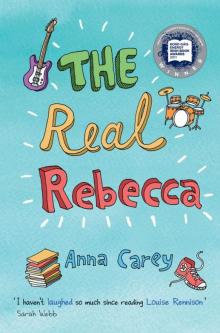 The Real Rebecca
The Real Rebecca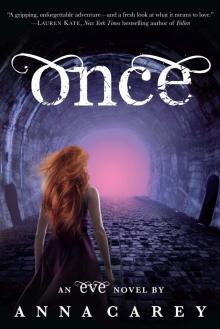 Once
Once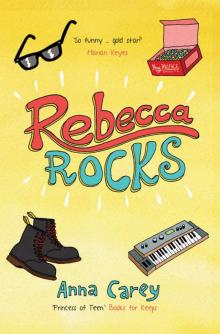 Rebecca Rocks
Rebecca Rocks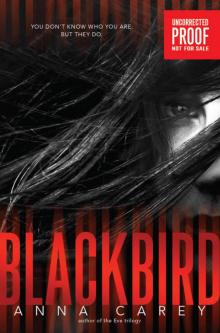 Blackbird
Blackbird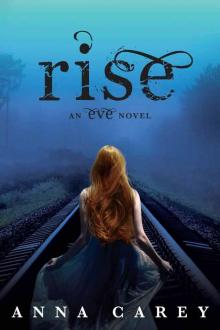 Rise
Rise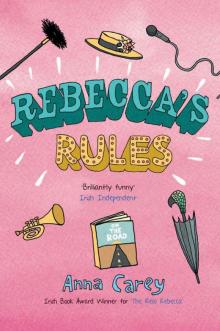 Rebecca's Rules
Rebecca's Rules Deadfall
Deadfall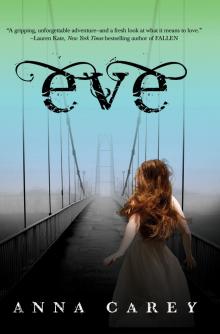 Eve
Eve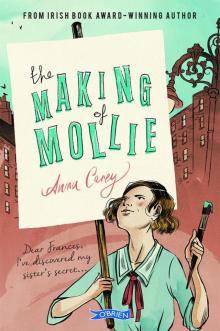 The Making of Mollie
The Making of Mollie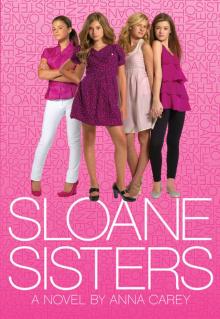 Sloane Sisters
Sloane Sisters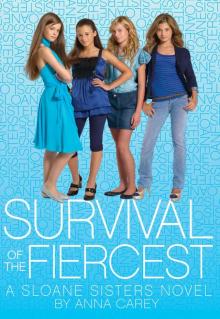 Survival of the Fiercest
Survival of the Fiercest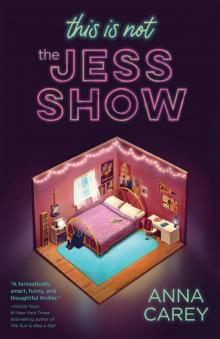 This Is Not the Jess Show
This Is Not the Jess Show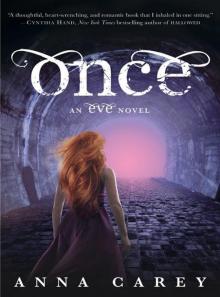 Once: An Eve Novel
Once: An Eve Novel